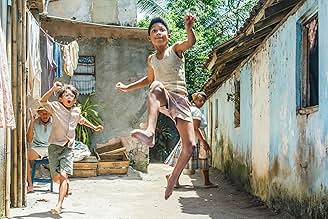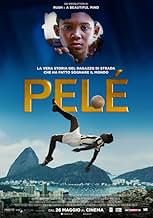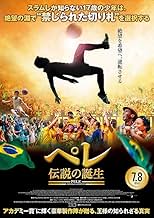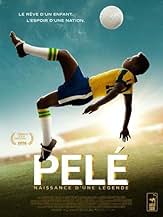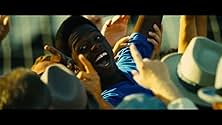IMDb RATING
7.1/10
23K
YOUR RATING
Pele's meteoric rise from the slums of Sao Paulo to leading Brazil to its first World Cup victory at the age of 17 is chronicled in this biographical drama.Pele's meteoric rise from the slums of Sao Paulo to leading Brazil to its first World Cup victory at the age of 17 is chronicled in this biographical drama.Pele's meteoric rise from the slums of Sao Paulo to leading Brazil to its first World Cup victory at the age of 17 is chronicled in this biographical drama.
- Directors
- Writers
- Stars
Phil Miler
- Narrator
- (voice)
Eric Bell Jr.
- Zoca
- (voice)
- Directors
- Writers
- All cast & crew
- Production, box office & more at IMDbPro
7.122.7K
1
2
3
4
5
6
7
8
9
10
Featured reviews
"Pelé: Birth of a Legend" is a flawed, but inspiring film.
Brazilian teams play a style of soccer all their own. (Yeah, I called it soccer. Gimmie a break. I'm an American.) They call that style "ginga". It's a very fluid kind of play that emphasizes creative ball control. Some call this style of play "flamboyant". Others dismiss it as "trick plays". Brazilians simply think of it as
their heritage. The Urban Dictionary's definition of ginga states, in part, "Ginga is creativity... the opposite of mechanical soccer. It is having fun with the ball. It is grace. It is being fluid and coordinated. IT IS SOUL. IT IS DANCE." A June 15, 2014 "New York Times" article explains the development of ginga this way: "
an imaginative style of play that made competition and gratifying playfulness inseparable, with blacks and people of mixed race rising from exclusion and becoming its main protagonists." Ginga is a unique mixing of the skills of samba dancers with Brazilian martial arts fighters, all applied to the game of soccer, turning it into, as the Brazilians call it, "the beautiful game", while also celebrating Brazil's different races and cultures. The focus on ginga in the biopic "Pelé: Birth of a Legend" (PG, 1:47) educates its audience, celebrates that style of soccer and captivates Movie Fans with the true rags-to-riches story of the greatest soccer player ever, a man known all around the world simply as
Pelé.
As the film opens, the nearly 10-year-old Pelé (born Edson Arantes do Nascimento, and called "Dico" by his family and friends) is watching a television broadcast as his native Brazil loses the 1950 World Cup to Uruguay. Brazil's loss was a huge upset, a phrase which also describes the emotions of Brazil's soccer fans (which was basically everybody). The entire country was shocked, humiliated and demoralized. Dico (Leonardo Lima Carvalho) promises his father, a former soccer player known as Dondinho (played by Brazilian musician/actor Seu Jorge), that he, Dico, will one day bring Brazil a World Cup Championship.
Dico's family is so poor that Dico doesn't even own a soccer ball – or even a pair of shoes, but the kid manages to develop his natural talent anyway. Under his father's tutelage, he learns ball-handling by juggling and kicking grapefruits and he plays on a local team with his friends. Their team is literally called "The Shoeless Ones" and is mercilessly mocked by the town's rich kids, who single out Dico for a special measure of abuse and start calling him "Pelé". It's a made-up name which is meant to be an insult, and Dico hates the name, but as he works through his anger by helping his team play better than expected on the soccer field, the name sticks, and "Pelé" becomes synonymous with Dico and his amazing talent.
Continuing to hone his skills on his own time and play brilliantly on the field in spite of having to endure prejudice and personal tragedy, Pelé (played as a teenager by Kevin de Paula) is recruited and mentored by former player Waldemar De Brito (Milton Gonçalves). Pelé's talent gets him a spot on a professional soccer club, Santos FC, and then on Brazil's national team, all before he reached the age of 17. On the national team, Pelé's coach is Vicente Feola (Vincent D'Onofrio), the latest in a series of coaches who tries to beat Pelé's individuality out of him and force him to play a more traditional and "sophisticated" European style. Many Brazilians blamed the ginga style of play for the 1950 World Cup loss, but ginga is Pelé's strength. Pelé finds himself struggling with his coach's instruction, and an old adversary turned teammate, plus a significant knee injury, all while the national team prepares for the 1958 World Cup tournament and a possible championship matchup against the heavily-favored team representing the host country of Sweden, coached by the arrogant and condescending George Raynor (Colm Meaney).
"Pelé: Birth of a Legend" represents formulaic and unrefined filmmaking, but still manages to inspire on multiple levels. Co-written and co-directed by brothers Jeff and Michael Zimbalist (both working on their first feature film), the movie follows the tried-and-true pattern of most sports movies, but suffers from some minor issues of technique. The script sometimes stops short of completing its thoughts and the film is a bit over-edited, making the viewer feel like something is missing in a few of the scenes. Some characters are underdeveloped and some of the acting is shaky, but the main characters (especially D'Onofrio, Jorge and de Paula) all give strong performances. The film spends too much time on Pelé's childhood and not enough time on his rise through the ranks of Brazilian soccer, but does convey why Pelé was so good and wisely culminates with the '58 World Cup, at which point it's clear that all the pieces are finally in place for Pelé's eventual worldwide fame and unparalleled success. In spite of the film's lack of originality and other relatively minor problems, the Zimbalist brothers and their cast and crew give us plenty to shout about during the film's third act and leaves us with important lessons about determination, resilience and playing to our strengths, as well as the importance and strength of diversity. As much as I enjoyed "Pelé: Birth of a Legend" (especially its emotional ending), after fairly weighing all of its strengths and weaknesses, the most I can give it is a mild recommendation: "B"
As the film opens, the nearly 10-year-old Pelé (born Edson Arantes do Nascimento, and called "Dico" by his family and friends) is watching a television broadcast as his native Brazil loses the 1950 World Cup to Uruguay. Brazil's loss was a huge upset, a phrase which also describes the emotions of Brazil's soccer fans (which was basically everybody). The entire country was shocked, humiliated and demoralized. Dico (Leonardo Lima Carvalho) promises his father, a former soccer player known as Dondinho (played by Brazilian musician/actor Seu Jorge), that he, Dico, will one day bring Brazil a World Cup Championship.
Dico's family is so poor that Dico doesn't even own a soccer ball – or even a pair of shoes, but the kid manages to develop his natural talent anyway. Under his father's tutelage, he learns ball-handling by juggling and kicking grapefruits and he plays on a local team with his friends. Their team is literally called "The Shoeless Ones" and is mercilessly mocked by the town's rich kids, who single out Dico for a special measure of abuse and start calling him "Pelé". It's a made-up name which is meant to be an insult, and Dico hates the name, but as he works through his anger by helping his team play better than expected on the soccer field, the name sticks, and "Pelé" becomes synonymous with Dico and his amazing talent.
Continuing to hone his skills on his own time and play brilliantly on the field in spite of having to endure prejudice and personal tragedy, Pelé (played as a teenager by Kevin de Paula) is recruited and mentored by former player Waldemar De Brito (Milton Gonçalves). Pelé's talent gets him a spot on a professional soccer club, Santos FC, and then on Brazil's national team, all before he reached the age of 17. On the national team, Pelé's coach is Vicente Feola (Vincent D'Onofrio), the latest in a series of coaches who tries to beat Pelé's individuality out of him and force him to play a more traditional and "sophisticated" European style. Many Brazilians blamed the ginga style of play for the 1950 World Cup loss, but ginga is Pelé's strength. Pelé finds himself struggling with his coach's instruction, and an old adversary turned teammate, plus a significant knee injury, all while the national team prepares for the 1958 World Cup tournament and a possible championship matchup against the heavily-favored team representing the host country of Sweden, coached by the arrogant and condescending George Raynor (Colm Meaney).
"Pelé: Birth of a Legend" represents formulaic and unrefined filmmaking, but still manages to inspire on multiple levels. Co-written and co-directed by brothers Jeff and Michael Zimbalist (both working on their first feature film), the movie follows the tried-and-true pattern of most sports movies, but suffers from some minor issues of technique. The script sometimes stops short of completing its thoughts and the film is a bit over-edited, making the viewer feel like something is missing in a few of the scenes. Some characters are underdeveloped and some of the acting is shaky, but the main characters (especially D'Onofrio, Jorge and de Paula) all give strong performances. The film spends too much time on Pelé's childhood and not enough time on his rise through the ranks of Brazilian soccer, but does convey why Pelé was so good and wisely culminates with the '58 World Cup, at which point it's clear that all the pieces are finally in place for Pelé's eventual worldwide fame and unparalleled success. In spite of the film's lack of originality and other relatively minor problems, the Zimbalist brothers and their cast and crew give us plenty to shout about during the film's third act and leaves us with important lessons about determination, resilience and playing to our strengths, as well as the importance and strength of diversity. As much as I enjoyed "Pelé: Birth of a Legend" (especially its emotional ending), after fairly weighing all of its strengths and weaknesses, the most I can give it is a mild recommendation: "B"
A compelling narrative, but factually inaccurate and unfair
I want to state first that I do really like Pélé, he is one of the best athletes in history, not only in his athletic performance but also in his conduct outside the pitch.
His compelling personality is well displayed and I cannot speak with certainty about his background, but I suspect that while it was challenging it was perhaps not quite as bad as it is displayed at times.
My main problem with the movie is the display of the national teams aside from the brazilians. It was at this time and unlike the depiction of the movie well known that Brazil was a good team, perhaps not the favorites to win, but by no means a complete underdog. The favorites to win were West Germany, France and the Soviet Union. Sweden who is antagonisticly depicted was a nation with many players at the very end of their career and though the population was excited at their nations participation and that for the first time (for the swedes) professional players playing in clubs abroad would be permitted to play for the national team. So people were hopeful that with homefield advantage and the addition of a handful of worldclass professionals though perhaps past their prime(Niels Liedholm 36 at the time and Gunnar Gren 38) that maybe possibly Sweden could win.
So the primary factual error here is that Brazil was by no means colossal underdogs and the Swedes were not as massively favored as depicted and certainly not as arrogant and demeaning as they are shown. Though there is some truth in their strategy in the final game, the swedes did hope to try and score an early goal hoping the brazilians would be unable to recover.(According to Niels Liedholm).
I also find it unfortunate that while racism is horrible and was certainly present even amongst my own swedish ancestors. It is very unfortunate that this media never depicted some of the really inspiring moments of people in this tournament. Because in the end Pélé have stated that the swedish king at the time went down to meet the players on both sides and shook everybodys hand and chatted with them regardless of what they looked like. For many people just like the king football have no color and whilst Péle has had to deal with his fair share of racism he has seldom dwelt on the negative, but almost always uplifted the positive.
For my parents who vividly remember this tournament and who have always held Pélé in very high regard as both a footballer and a person. It was rather difficult to swallow the depiction of his opponents(our national team in particular) and that of the tournament as a whole which is perhaps one of the most memorable world cups in history with Pélé the 17-year old wunderkind and Just Fontaine who set a record of scoring goals that to this day stands.
His compelling personality is well displayed and I cannot speak with certainty about his background, but I suspect that while it was challenging it was perhaps not quite as bad as it is displayed at times.
My main problem with the movie is the display of the national teams aside from the brazilians. It was at this time and unlike the depiction of the movie well known that Brazil was a good team, perhaps not the favorites to win, but by no means a complete underdog. The favorites to win were West Germany, France and the Soviet Union. Sweden who is antagonisticly depicted was a nation with many players at the very end of their career and though the population was excited at their nations participation and that for the first time (for the swedes) professional players playing in clubs abroad would be permitted to play for the national team. So people were hopeful that with homefield advantage and the addition of a handful of worldclass professionals though perhaps past their prime(Niels Liedholm 36 at the time and Gunnar Gren 38) that maybe possibly Sweden could win.
So the primary factual error here is that Brazil was by no means colossal underdogs and the Swedes were not as massively favored as depicted and certainly not as arrogant and demeaning as they are shown. Though there is some truth in their strategy in the final game, the swedes did hope to try and score an early goal hoping the brazilians would be unable to recover.(According to Niels Liedholm).
I also find it unfortunate that while racism is horrible and was certainly present even amongst my own swedish ancestors. It is very unfortunate that this media never depicted some of the really inspiring moments of people in this tournament. Because in the end Pélé have stated that the swedish king at the time went down to meet the players on both sides and shook everybodys hand and chatted with them regardless of what they looked like. For many people just like the king football have no color and whilst Péle has had to deal with his fair share of racism he has seldom dwelt on the negative, but almost always uplifted the positive.
For my parents who vividly remember this tournament and who have always held Pélé in very high regard as both a footballer and a person. It was rather difficult to swallow the depiction of his opponents(our national team in particular) and that of the tournament as a whole which is perhaps one of the most memorable world cups in history with Pélé the 17-year old wunderkind and Just Fontaine who set a record of scoring goals that to this day stands.
If only every film could have the star in the audience!
I was invited to the world premier of this film at the TriBeCa Film Festival, in New York. I say invited, as if my life is some sort of glamorous affair. In reality, a mate at work couldn't make it, and he knew I'd have no actual plans, so I eagerly obliged.
Just before the movie started, the 350 or so people in the audience got what they wanted, as the man himself stood up and raised his hand to the instagram happy crowd. Just knowing Pele was in the audience gave the room a little extra energy.
Perhaps a little naive, I knew a little about Pele's playing career but little of the man and, the journey to what he became. The film follows his early years with friends at home, up until he becomes 17 and plays for Brazil in the 1958 World Cup in Sweden. There's enough humour, big laughs, drama, and passion in the film that will translate to fans familiar with the legend and those who may have only heard of him.
The real treat, were the applause, and cheering from the audience when the on-screen Pele scored. His hand went up in recognition and the cheers got louder. I was pleased that despite the film keeping my attention he may have nodded off, he's knocking on a bit.
I waited outside afterward and managed to get a signed Santos shirt from him, which kinda gave me goose pimples, and rammed home the magnitude of who this man was, and what he had done for the game. My dad would have been proud. Sadly the shirt is the guys from work, so I'm currently deciding whether to buy a replica shirt and say I didn't get it, or beginning to practice the man's signature! That's okay, isn't it...
I did snap a selfie. Insta - Jamesbydesign
Just before the movie started, the 350 or so people in the audience got what they wanted, as the man himself stood up and raised his hand to the instagram happy crowd. Just knowing Pele was in the audience gave the room a little extra energy.
Perhaps a little naive, I knew a little about Pele's playing career but little of the man and, the journey to what he became. The film follows his early years with friends at home, up until he becomes 17 and plays for Brazil in the 1958 World Cup in Sweden. There's enough humour, big laughs, drama, and passion in the film that will translate to fans familiar with the legend and those who may have only heard of him.
The real treat, were the applause, and cheering from the audience when the on-screen Pele scored. His hand went up in recognition and the cheers got louder. I was pleased that despite the film keeping my attention he may have nodded off, he's knocking on a bit.
I waited outside afterward and managed to get a signed Santos shirt from him, which kinda gave me goose pimples, and rammed home the magnitude of who this man was, and what he had done for the game. My dad would have been proud. Sadly the shirt is the guys from work, so I'm currently deciding whether to buy a replica shirt and say I didn't get it, or beginning to practice the man's signature! That's okay, isn't it...
I did snap a selfie. Insta - Jamesbydesign
Inspirational.
The best movie ever, because I feel very inspired by this amazing and one of a kind movie.
It's a kick
Greetings again from the darkness. From rags to riches
a common expression that often leads to a paint-by-numbers movie. Co-directors Jeff Zimbalist and Michael Zimbalist are fortunate in that their "coming of age" subject is the globally famous Pele' – often considered the greatest soccer/futbol player of all-time.
Rather than revisit the career of the transcendent player who later dedicated his life to humanitarian causes, the film kicks off with a 17 year old Pele trotting out onto the pitch at the 1958 World Cup. It then flashes back 8 years to when 9 year old "Dico" was growing up in the slums of Sao Paulo. We get to see his relationship with his family his dad taught him to play, and his friends were loyal to him and encouraged him to pursue his dream.
There are some similarities to "The Sandlot" as we watch the joy these boys have in playing the sport whenever and wherever they can plus the origin of the somewhat derogatory and now immortal nickname. It seemed that Pele' was able to carry this love of the game throughout his career. We see boys huddled around a radio listening to the 1950 World Cup as Brazil's team was humiliated an event that played a role in Pele' returning pride to a bruised country.
Kevin de Paula plays Pele' as he works his way up through the age groups and national teams. Often the youngest and shortest player, the film depicts him as a shy kid often out of his element the polar opposite to the beaming superstar we so often saw later in his career. There is an explanation of the roots of the "Ginga" style and its ties to the Brazilian culture and martial arts.
For some reason, Vincent D'Onofrio is cast as Brazil's Coach Feola and we are forced to endure a tortuous accent that is basically inexcusable these days. There are also some exaggerations in the crowd scenes and shots of the press, though young de Paula underplays the lead. Colm Meaney plays George Raynor, the coach of Sweden in that infamous 1958 World Cup, and we do get a cute little cameo from Pele' himself.
The film does a nice job with the young man's childhood and progression towards superstar (the IOC named him the athlete of the century). He is presented as close to his family, and inherently quiet and calm. The match clips of Pele' that play over the closing credits are proof that a movie just can't capture the transcendence of his talent. Pele' is truly the reason it's "the beautiful game".
Rather than revisit the career of the transcendent player who later dedicated his life to humanitarian causes, the film kicks off with a 17 year old Pele trotting out onto the pitch at the 1958 World Cup. It then flashes back 8 years to when 9 year old "Dico" was growing up in the slums of Sao Paulo. We get to see his relationship with his family his dad taught him to play, and his friends were loyal to him and encouraged him to pursue his dream.
There are some similarities to "The Sandlot" as we watch the joy these boys have in playing the sport whenever and wherever they can plus the origin of the somewhat derogatory and now immortal nickname. It seemed that Pele' was able to carry this love of the game throughout his career. We see boys huddled around a radio listening to the 1950 World Cup as Brazil's team was humiliated an event that played a role in Pele' returning pride to a bruised country.
Kevin de Paula plays Pele' as he works his way up through the age groups and national teams. Often the youngest and shortest player, the film depicts him as a shy kid often out of his element the polar opposite to the beaming superstar we so often saw later in his career. There is an explanation of the roots of the "Ginga" style and its ties to the Brazilian culture and martial arts.
For some reason, Vincent D'Onofrio is cast as Brazil's Coach Feola and we are forced to endure a tortuous accent that is basically inexcusable these days. There are also some exaggerations in the crowd scenes and shots of the press, though young de Paula underplays the lead. Colm Meaney plays George Raynor, the coach of Sweden in that infamous 1958 World Cup, and we do get a cute little cameo from Pele' himself.
The film does a nice job with the young man's childhood and progression towards superstar (the IOC named him the athlete of the century). He is presented as close to his family, and inherently quiet and calm. The match clips of Pele' that play over the closing credits are proof that a movie just can't capture the transcendence of his talent. Pele' is truly the reason it's "the beautiful game".
Did you know
- TriviaThe Old Guy in suit who's tea was dropped by the Brazilian team at the hotel before the Final of 1958 World cup was actually the real Pele as himself.
- GoofsIn the film, Pelè's mother is a servant in Josè Altafini "Mazzola's" home. In real life, both Pelè and Altafini were from modest families. They also lived in different towns.
- Crazy creditsThe end credits include the disclaimer that "The persons and events in this motion picture are fictitious. Any similarity to actual persons or events is unintentional." Which is of course ridiculous considering this is a biopic of Pelé loaded with real events (like the 1958 world cup).
- ConnectionsFeatures 1958 FIFA World Cup (1958)
- How long is Pele: Birth of a Legend?Powered by Alexa
Details
- Release date
- Country of origin
- Official site
- Languages
- Also known as
- Pelé: Birth of a Legend
- Filming locations
- Production companies
- See more company credits at IMDbPro
Box office
- Gross US & Canada
- $57,046
- Opening weekend US & Canada
- $7,226
- May 15, 2016
- Gross worldwide
- $7,846,608
- Runtime
- 1h 47m(107 min)
- Color
- Aspect ratio
- 2.35 : 1
Contribute to this page
Suggest an edit or add missing content



